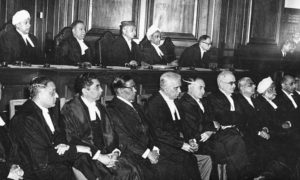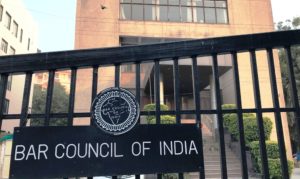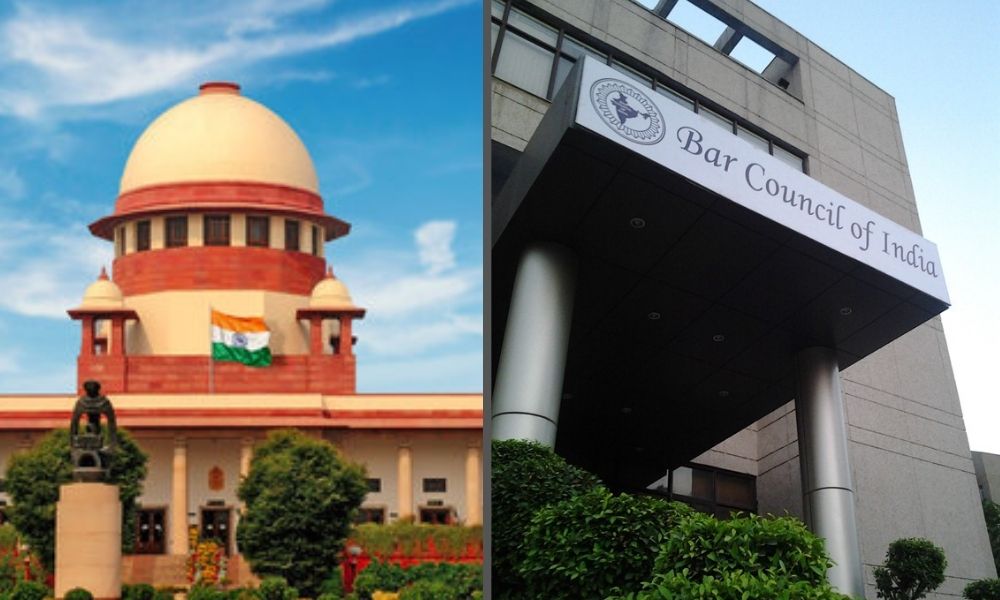By Sakshi Manoj Chhabra-
Bar can be a collective term for all the Attorneys who are licensed to practice within the Courts, or a specific court of any particular State.
Bench means all the Judges taken together as one but different from the Bar. Bench is that part of the Court, which is considered in its official scope, while the Judges are sitting.
Bar
The earlier meaning of ‘Bar’ also contained a part of the Bench. Also, in the present time the term Bar is even applied for the attorney’s part of the court and this term is also used for the judicial officer’s part. The term Bar was originated in England with the partition of Bar fixed for dividing the court room into two different parts for the aim of separating lawyers and officers of the court from the suitors and the general public.

According to the Black’s Law Dictionary Bar is the railing that differentiates the front area of the court where the Judges sit, court personnel, lawyers, and witnesses of the court matters; from the rear are which provides sitting for the observers. Bar is as important as the Bench in the courtroom.
Bench
Bench in the legal concept can have different meanings.
Firstly, it simply indicates the location where the Judges normally sit.
Second, the term Bench could be a metonym to describe the members of the Judiciary collectively, or the Judges of a specific court, like the Queen’s Bench or the Common Bench in England as well as in Wales.
Third, this term is employed to differentiate the Judges from the Attorneys or the Barristers. The Bench is a collective term for all the Judges together whereas the term Bar denotes all the lawyers.
Lastly, the term ‘full bench’ is when all the Judges of a particular court sit together in order to decide a case, as said in the phrase ‘before the full bench’ which is also observed as ‘en blanc’.

The Bench is actually an elevated desk area that allows a Judge to look at the entire courtroom. The Bench was an exemplary feature of the Courts of the order of St. John in Malta, like the Castellania, where Judges along with the nominated college of Advocates sat for the court proceedings and to review the laws as well.
What Judge requires from an Advocate?
An Advocate is found to be useful and effective by the Judge if he satisfies all the requirements of the Judge, and a Judge requires an Advocate to assist him in reaching the conclusion of the case and thereby helping within the performance of his own role. it’s impossible for an advocate to try and do so unless he’s equipped with the specified skills.
The bar commonly refers to the community. With a modifier, it should sit down with a branch or division of the profession: as an example, lawyers who concentrate on filing civil suits for damages.
In conjunction with the Bench, Bar may differentiate lawyers who represent clients (the bar) from Judges or members of a judiciary (the bench).
The phrase bench and bar denote all judges and lawyers collectively.
Attainment of justice for all the parties of the case and therefore the society at an outsized is that the main objective of our scheme. The Bar and Bench are the essential partners for fulfilling this objective of our judiciary, with the Judiciary at the highest of a vibrant bar.
Both the partners must have sympathy and respect between one another, and every partner has its duties which they ought to perform diligently and effectively so as to enable the system to function in its best way. Failure of performing any duty by anyone partner will affect the opposite partner naturally.
Thus, it is the duty of both the parties i.e., the Bench and Bar to perform their work diligently effectively, and honestly so as to attain justice in society.
Functioning relationship between the Bar and the Bench
The courtroom where the cases are discussed comprises two parts namely, the place where the Judges sit is known as Bench and the place where the Advocates sit is known as the Bar.
So, the term ‘Bench’ refers to the judges and also the ‘Bar’ refers to the Advocates. The faith on the judiciary to the final public and therefore the speedy justice mainly depends on the cordial relation between the Judges and also the Advocates.
In the Administration of justice, the role of Advocates are equally important like the role of the Judges. Rendering justice in the court is their joint responsibility. Without the assistance of Advocates, it is highly difficult for the Judges to arrive to an accurate decision during a dispute. If good relation exists between the Judges and Advocates, then delay in rendering justice and high expenses for getting justice may be considerably reduced.
To strengthen this good relationship both should have some good qualities and mutual responsibilities. Administration of Justice is not something that just involves the presence of the Bench.
To preserve the cordial ties between the Bar and also the Bench, mutual respect is a very important aspect between both the parties. Lawyers and Judges must constantly support each other. The bar is considered as the primary recruiting ground for Judges and they both are considered a member of the identical culture.
Bar and Bench will have cordial relationships with one another. But thanks to the character of the duties to be performed by Advocates and Judges, occasionally, funny, often heated and infrequently harsh, they will enter into dialogue. Scandalizing the court by an Advocate also pollutes the very basis of justice and such behavior by a lawyer gives disrepute to the full administration of justice.
An Advocate’s attitude towards the Tribunal should be one amongst universal reverence, no matter the Court’s position. Advocates Private opinion about the presiding Judge should not be harsh and defaming because he must preserve the integrity of the judiciary as an establishment, he must not demonstrate in his actions. Likewise, it’s the Judiciary’s duty to not only to be respectful towards the Bar members but to try and do everything possible to push the high traditions of the Bar.
A lawyer or Judge’s uncourteous conduct or wrongdoing can amount to contempt of the court, there are two kinds of contempt of the court. For instance, to use insulting language against a judge or to threaten him with transfer or removal or to approach the judge in an exceedingly loose manner or to challenge his authority to ask questions or to form scandalous allegations against a Judge etc.
Such incidents amount to Contempt of Court. The Court’s contempt punishment is meant to safeguard public trust within the Administration of Justice system.
In Mahant Hakumat Rai v. Emperor2[1] the Lahore tribunal had held that,
“Without failing in respect to the Bench, it is the duty of the members of the Bar to claim their rights to be heard by the tribunal before which they are practicing. They must be fearless and absolutely independent in the discharge of their duties and it would be perfectly right on the part of the Advocate to protest against irregular procedure on the part of any Judge and if the Advocate is wrongly checked or at fault, he should vindicate the independence of the Bar.
He would be completely justified in getting an appropriate hearing and he would be perfectly right in objecting against any interruption within the course of the hearing or argument such as to disturb him in performing his duty towards his client.
Plenary powers vested in the presiding officer of the court, apart from the fact that they have rarely been used against the members of the legal profession so far, should only be used to vindicate the honor of the court or to satisfy the necessities of public justice and not as a matter of course.”
Role of the Bar to Strengthen the Bar-Bench Relation
In order to strengthen the relations between the Bar and the Bench, the Advocates must take the subsequent steps.
- The Advocates must give due relevance and respect to the Judges and must avoid speaking ill about the Judges and the Judiciary,
- The Advocates must help the Judges during the court proceedings by presenting the proper law in a clear manner. They must never act in a way so as to irritate the Judges.
- If the Judge gives an improper verdict, the Advocates must not criticize the Judges but must attempt to set the wrong verdict through an appeal.
- For getting a favorable order the Advocates should not pressurize or influence the presiding Judge.
- If the Judge’s behavior is improper and disrespectful towards an Advocate, the Advocate should not enter into an on-spot confrontation but must approach the Bar Association in order to discuss the matter in a lawful manner.
Role of the Bench to Strengthen the Bar-Bench Relation
Only when the Bar-Bench relations are strengthened, the general public will have confidence and faith in the Judiciary. In order to strengthen the relations between the Bar and the Bench, the Judges must take the subsequent steps.
- Judicial Respect: The Judges should give due respect to the Advocates as well as to the brethren Judges.
- Patient Hearing: Judges should hear the Court proceedings with an open mind and without any bias. They must only act to render Justice to the society. The Judges should sufficient opportunity to the Advocates to present their case fully.
- Impartiality: Judges should act impartially. They should not act in favor of any Advocate or in favor of any party to the dispute.
- Avoidance of Interruptions: As far as possible, Judges must avoid interrupting the Advocates while examining their witnesses or during the arguments. Interference may adversely affect the Advocates and he might not be able to present the case in an effective manner.
- Avoidance of Unreasonable Adjournments: Adjournments should always be made on reasonable and sufficient grounds. Unreasonable adjournments are the prime cause for arrears in the cases and further causing harm to the parties.
- Speedy Disposal: We all know about the saying ‘Justice delayed is Justice denied’. Thus, cases should be disposed off as soon as possible. When preference is given for disposal of the old cases, it should be determined that the new cases do not get into arrears.

Duties of the Bar
- It is the duty of an Advocate to keep respectful attitude towards the court, not only for the sake of the temporary incumbent of the Judicial office, but to keep up its supreme importance. Judges, not being wholly liberated to defend themselves, are peculiarly entitled to receive the support of the Bar against unjust criticism and clamor of the general public.
- An Advocate should be punctual in all court appearances and, whenever possible, the Advocate should give prior notice to the court and to all or any other counsel within the case, of any situations requiring his tardiness or absence.
- Advocates should make every reasonable effort to arrange himself fully before court appearances.
- An Advocate should see to that all the depositions and other documents required to filed are filed promptly, should stipulate with opposing counsel to all or any non-controverted facts, should give the opposing counsel, on reasonable request, a chance ahead to examine all evidence of which the law permits inspection, and generally, should do everything possible to avoid delays and to expedite the trail.
Duties of the Bench
- The protection of the Independence of the Judiciary should be the top must duty of the Judge
- Meetings should be held at regular intervals between the Judges and the Advocates so that they can advance their difficulties in front on each other, and it may be sorted out in an appropriate manner.
- Interpretation of Statutes should be done by the court to render fair justice to the parties. Moreover, Harsh comments should be avoided within the courtroom and should always possess a peaceful temper.
- The character as well as the conduct of a Judge shall be praiseworthy, and he should always have personal and intellectual integrity. A Judge should always have knowledge about the recent developments and changes made in the law.

Inter Relations between the Bar and the Bench
- If the independent Judiciary is considered as the most important pillar of democracy, the Bar is regarded as the foundation of the independent Judiciary. The Bar is the mother of the Bench and also the bright mirror of the Judicial Officers whose image, character and conduct is correctly and visibly reflected therein, and it’s for the Bench to nurse and nourish the merits of the Bar.
- It has been an age old saying that the ‘court and counsel are two wheels of the chariot of justice’.
- Within the justice delivery system, it is the closest harmony between the Bar and also the Bench which will yield the most effective leads in achieving the objectives enshrined in our Constitutional Document.
- The Bar as well as the Bench are two sides of a coin. Thus, in order to ensure Justice both the partners have to work together efficiently and effectively.
Dignity of the Bar and the Bench
The Colonial System of Judicial Courts has not yet developed into a complete representative Democracy. Thus, it is clear that the relationship between the Bar and Bench have not fully evolved as equally responsible functionaries for the effective discharge of legal justice.
What this situation demands is a cordial and mutually respectful Bar and Bench with high aspirations towards the welfare of the people and also the protection of the fundamental, constitutional, and human rights of the aggrieved citizens.
Our Father of the Nation, Mahatma Gandhi was also an Advocate, and his sole dream was to ensure justice in our country. Whether the title is Bar and Bench or Bench and Bar, it is difficult to differentiate as practically there’s not much difference in both.
The Supreme Court in P. D. Gupta v. Ram Murti and Others[2] case has laid down the court’s opinion on Bar and Bench relation in the following words:
“An advocate should be fair not only towards his client but also towards the court furthermore as towards the opposite party of the case. The procedure of administration of justice must be kept clean and uncorrupted.
The Administration of justice is not only a matter of concern for the Bench, but it also concerns both the Bench as well as the Bar. The principal ground for recruiting judges is the Bar, both the judges and the advocates together complement one another.
The prime duty of an Advocate is to present the case in court by informing the court about the law and also the facts of the case and to assist the court in arising at the conclusion of the case. For an effective administration of justice, an advocate shall possess good advocacy skills, so that he can imply the case in court properly and not get interrupted by the judge unless the interruption is critical.”
To conclude this part, we can say that a free and fearless Bar is not to be preferred to an independent Judiciary, nor can an independent Judiciary to a free Bar. Neither incorporates primacy over the other. The liberty of the Bar presupposes an independent judiciary through which that freedom may, if necessary, be vindicated.
Finally reciprocal adjustment of conduct by the Bench as well as the Bar is the keystone to the sleek and effective functioning of the Courts.
Whether someone is a member of the Bar or a member of the Bench they come from the same category people known as law graduates. You may encounter with many people who were at one point of time members of the Bar and now are the members of the Bench.
Bar and Bench collectively means the cordial relationship between the Judges and Advocates.
References:
- Mahant Hakumat Rai v. Emperor2, AIR 1943 Lahore 14 ↑
- P. D. Gupta v. Ram Murti and Others, AIR 1997 SC 283 ↑

